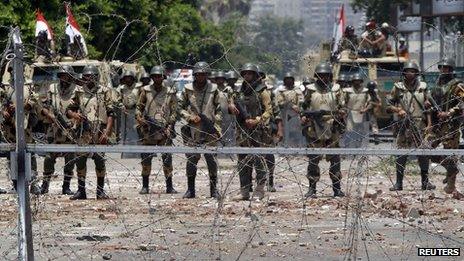Egypt's political unrest causes regional concern
- Published

The army stepped in to remove Egypt's first freely-elected, Islamist, president
The removal from office of a president drawn from the ranks of the Muslim Brotherhood by the Egyptian military clearly has implications for political Islam around the region.
Similar movements in Tunisia and Syria have been watching events closely and will be drawing their own lessons.
Did the Egyptian Muslim Brotherhood over-reach?
Or is this, as more strident Salafist Islamist groups have determined, a lesson that conservative states in the region and entrenched vested interests like the military will not accept democracy if it brings to power the likes of Muslim Brothers?
Whatever the viewpoint, it is clear that the most immediate impact of the latest upheavals in Egypt is on, what might be called, its own backyard - the Sinai Peninsula and the Gaza Strip. And developments here impact upon the broader relationship between Egypt and Israel.
The political crisis in Egypt has prompted an upsurge of violence in the Sinai Peninsula, with various jihadist militias - made up, experts believe, of local Bedouin with a sprinkling of foreign fighters -attacking Egyptian army road-blocks and other government positions.
An important gas pipeline has been attacked again; just the latest of a series of attacks on the energy infrastructure.
The developing anarchy in the Sinai is seen by the top echelons of the Egyptian military as very dangerous.
While the level of Egyptian forces in the Sinai is controlled under the terms of its peace deal with Israel, agreement has been reached on bolstering Egyptian forces with an additional mechanised brigade, additional tanks, commando units and some Apache helicopters deployed.
This highlights the relatively good, business-like relationship between Israel and the Egyptian military. Indeed as the Israeli commentator Ehud Yaari has noted, ever since President Morsi came to power, he insisted that neither he nor his government would maintain any direct contacts with Israel. Such matters would remain the exclusive domain of the Egyptian military and intelligence services.
So to that extent security ties prospered.
Thus the military's ejection of the Muslim Brotherhood from power promises continuity in the bilateral relationship between Israel and Cairo.
The Egyptian military has been a strong supporter of the peace treaty with Israel and the massive injection of US aid that comes with it.
Inflamed tensions
However, many Israeli commentators remain uneasy at the political instability in Egypt.
Yes, in the short-term the demise of the Muslim Brotherhood is good news for Israel - especially since it further isolates Hamas in the Gaza Strip.
However, with uncertainty about the political future of Syria and Lebanon in the north and now Egypt again in the south, Israel finds itself surrounded by political forces that it can neither control nor predict.
In this sense, the best that it can probably hope for is a new, more secular, democratic government in Cairo that can at last begin to grapple with the huge problems of the Egyptian economy and social inequality.
It is in the Gaza Strip that the most immediate ramifications of the Egyptian crisis have been felt.
The ejection of its "older brother" from power in Egypt has only deepened the crisis facing the Palestinian Islamist organisation Hamas.
Its decision to throw in its political lot with the Syrian rebels has cost it support from its traditional backers in both Damascus and Tehran. Now it seems to be even more distanced from Cairo as well.
This has prompted unprecedented internal disagreements within Hamas, pitting civilian leaders who have pushed through the tilt towards the Syrian rebels against some in the organisation's military wing who fear their growing isolation.
In the short-term, the weak position of Hamas has prompted a significant effort to rein in more radical Palestinian groups who might seek to launch rocket attacks against Israel in order to broaden the crisis.
In addition, the Egyptian military's growing concerns about security at home - especially in the Sinai - mean that some smuggling tunnels into Gaza have been flooded. The Egyptian army wants to stop the flow of weapons and fighters from the Gaza Strip back into Egypt.
So the political crisis in Cairo is already having practical repercussions both in the Sinai and in the Gaza Strip.
Indeed the security vacuum in the Sinai has been a perpetual problem ever since the fall of the Mubarak regime. But the removal of President Morsi has inflamed tensions.
It has given the Hamas leadership in the Gaza Strip even more problems. And for Israel it leaves only question marks about its future neighbours to the south.